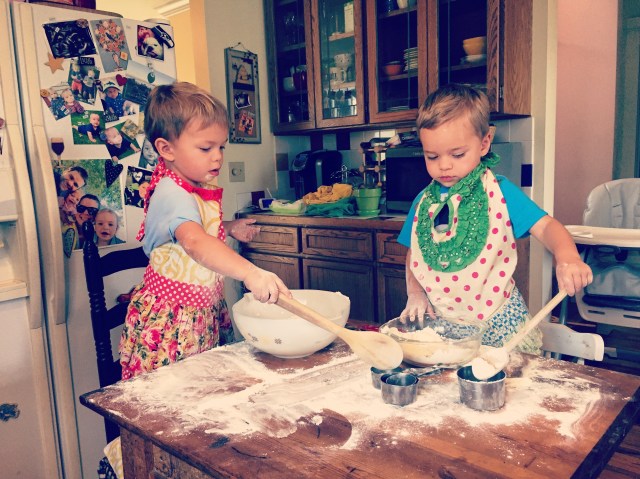Some of my earliest memories are sitting around a big wooden table with my mom, sisters, aunts, Grandma and Great Grandma, kneading dough. Aprons with flour down the front, heavy rolling pins, floral cheesecloths and always that gentle rhythm of kneading the dough.
I was 6 when I won my first County Fair ribbon. The local newspaper did an article about it: 4th place for “Rachel’s quick french bread.” I was so proud. Standing around that table with all of those strong women—and I was becoming one of them. I beamed.
Even now the smell of bread in the oven catapults me to that farmhouse kitchen in Rock Creek, Oregon. My Grandma’s house that her husband and sons built for her. It was always full of music and stories and something in the oven. Stories of my Grandma and Grandpa having dances in their old barn, of my Great Grandma traveling west in a covered wagon to teach in one room schoolhouse, of my Dad and his brothers and sisters working the farm, getting into mischief, growing up.
Stories of baking. Always the baking.
Grandma would tell us how before electricity, she used to put her hand in the wood stove to know if it was the right temperature. How making eight loaves in the morning was how she started each day. Standing in her Nike sneakers, I would watch her veiny hands expertly work each loaf and let me know when to add more flour. “Just keep kneading,” she would tell me. “You’ll know when it is ready.”
“Like this?” I would say. Pushing my whole body into it, over and over, my forearms burning.
“Yes. Just like that. Now, we let it rise.”
The loaves were put into pans and covered with a musty smelling dish towel. Then my sister and I were free to go swing on Grandma’s porch, or pick strawberries in her garden, walk down to the creek to look for frogs or twirl in her living room while her fingers bounced around on her accordion.
It’s the rising that is the most important step. It’s where the magic happens. If you fail to let it rise long enough, the bread will probably result in a hefty dental bill should you try to bite through it. “Let it be,” my Grandma would say. A couple hours would pass and we’d marvel at the puffed up loaves that had doubled in size. She would pop them into her oven and shoo us back outside.
When our cheeks were flushed and our hair tangled, the smell of bread baking would find us. We would migrate back, led by our noses and sit eagerly on the barstools waiting for a slice. We would eat an entire loaf together.
My Grandma was pure sunshine. Everyone’s favorite person. You would feel like she was hugging you, even if she was across the room. In her 86 years, she would climb mountain peaks, ski backcountry, run marathons and raise four kids. She was captain of a dragon boat team, organized a senior walking group that met every morning, rain or shine. Was a member of the Mazamas. Met the love of her life in her ’80s when she joined a bowling league. She clogged at Nordic festivals, biked from Portland to the coast four times and enjoyed her cold beer at the local pub. And she was FAMOUS for her homemade bread.
The years went by. My Dad got a new job and we moved away. I got older. I got busy, as 16-year-olds do. Pretty soon I only went to Grandma’s kitchen to bake on holidays and family trips. And sometimes I wouldn’t even go then. I had a tournament I couldn’t miss. A sleepover that was too important. Homework, friends, plans. Such important plans at the time.
I want to go back and sit next to that 16-year-old. I want to tell her to get in her red Pontiac, put $20 in the gas tank, pop in Alanis Morrisette and take a drive down to Portland to visit your Grandma. There is another tournament next weekend. Another date with a guy who ends up being not worth it. (There’s actually a lot of those coming.) All of those other plans can wait.
I miss her. I want to go back and sit on that stool in her kitchen. Bake with her. Ask her what my Dad was like when he was four. What her favorite perfume is. Did she do everything she wanted in life?
I wonder if she knows that I have her rolling pin. That Dad kept his promise to her. That we have our own little boys and they gather around our own wooden table now.
I sprinkle the flour and give them their own little loaves to kneed. They poke their pudgy fingers in the dough and push it out, roll it around, bring it all together. I watch them. “Like this Mommy?”
I understand now.
This is my time I get to shape them. Get my hands on them. Knead all of the love and traditions and life into them.
They want to be with me now. They want to be with me all of the time. They are looking to me to show them the world. Baking in our kitchen, there is nowhere they would rather be. But they will get older. Busier. They will make plans and have their own lives.
And as much as my hands will ache to be holding on to them—just as I am sure my Grandmother’s hands ached for me—I will have to let them be. Let them rise.
They will find their way back. Back to a wooden table. With flour smudged on their own kids’ cheeks and an old marble rolling pin. There will be stories and laughter and of course, fresh baked bread.











